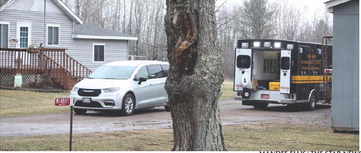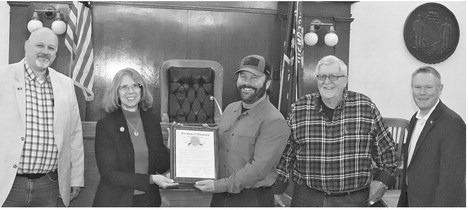Attorney urges more conversation before closed sessions
By Kevin O’Brien
In the future, before going into closed session, the Marathon County Board of Supervisors will be asked to have more thorough discussions about why certain conversations need to be kept private.
Corporation counsel Michael Puerner offered this advice earlier this month in response to a recent court of appeals decision in Wisconsin that found the city of Marinette had violated the state’s open meetings law by convening into closed session without providing an adequate justification to the public for why it needed to speak in secret.
In that case, Oitzinger v. City of Marinette, alderman Douglas Oitzinger filed suit after the council went into closed session at two different meetings to discuss an agreement with Tyco Fire Products after the company was found responsible for releasing PFAs into the city’s groundwater by flushing firefighting foam into the sewer system.
Puerner said one of the takeaways from the court’s ruling was that local units of government are being called upon to have conversations out in the open about whether a closed session is truly justified before simply citing one of the exemptions in state statute and doing a roll call vote.
Explaining the reason for a closed session can be particularly complicated, he said, when it comes to the exemption in Stat. 19.85(1)(e), which allows boards, councils and committees to speak in private when “deliberating or negotiating the purchasing of public properties, the investing of public funds or conducting other specified business, whenever competitive or bargaining reasons require a closed session.”
“You have to really justify, when you go into closed session for those reasons, that there is no other way to have that discussion in open session and protect your bargaining interests,” Puerner told supervisors. “If there is a way to have the discussion in open session without destroying the county’s bargaining position, you have to do it in open session.”
Puerner made the comments on April 10 while speaking to the chairs of all of the county’s standing committees, who meet once a month as the Executive Committee. As heads of their respective committees, Puerner said it’s up to them to have these conversations before calling for a vote on whether to convene into closed session.
Those conversations need to be specific enough so that both elected officials and the public understand why a confidential conversation is needed, but without divulging too much information so that another party involved in negotiations with the county would get an unfair advantage. One example would be the price range that supervisors are willing to pay for a piece of land.
If committee chairs are struggling to explain the rationale for a closed session, Puerner urged them to contact him before their meeting for advice. He also circulated a memo outlining his guidance in the wake of the court decision.
Board chairman Kurt Gibbs noted that the board’s rules already require corporation counsel to be consulted beforehand about any anticipated closed sessions, but he went one step further by reminding the committee chairs to keep closed session conversations strictly limited to the specific reason for needing privacy.
“When we’re in closed session, we need to keep the discussion germane to the reason that we’re in closed session,” he said. “Because it’s sometimes very easy for committee members to stray off the closed session subject and get into other issues that are germane to the topic, but are not germane to the reason for being in closed session.”
Vice-chair Chris Dickinson also suggested adding more language to the agenda whenever a topic is considered for closed session, just so people are aware ahead of time what will be talked about.
“It allows the public to come in and comment on that item,” he said.
Puerner agreed that Dickinson’s suggestion could be one way of spurring more conversation so that supervisors can decide ahead of time if they actually need to convene into closed session.
County administrator Lance Leonhard also pointed out that part of the court decision called out the city of Marinette for coming out of closed session and not explaining anything before voting to approve an action. Puerner agreed that providing context for a committee or board decision is also needed.
Supervisors had an opportunity to put Puerner’s advice into action on April 9 during a joint meeting of the Infrastructure and Human Resources, Finance and Capital committees. The agenda featured a closed session discussion on five parcels of land that the county is possibly interested in purchasing for a new Highway Department headquarters.
“In this case, there are five parcels listed, and the reason for going into closed session would be to have a discussion on negotiating strategy, which could include discussing purchase price,” Puerner said. “Of course, when you have that discussion in open session, you potentially compromise your bargaining position with the potential seller.”
Dickinson then asked if the committee was going to be discussing initial offers to purchase or counter-offers. In response, Leonhard said the county’s real estate representative had made contact with four of the five parcel owners, but no offers had been conveyed at that point.
Members of the two committees then voted unanimously to go into closed session, and when they reconvened, no action was taken on the five parcels that were under discussion.



